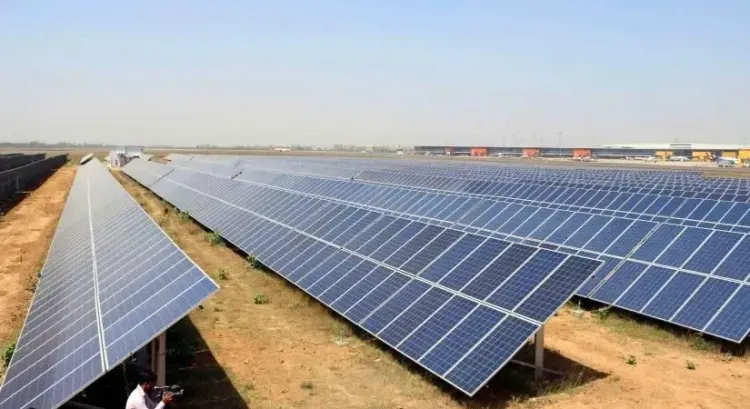Is the GST Rejig a Major Push Towards Advancing India’s Climate Goals?

Synopsis
Key Takeaways
- GST on solar and wind devices reduced from 12% to 5%.
- Encouragement of renewable energy adoption through cost reduction.
- Support for domestic manufacturing of solar products.
- Reduction in GST on biodegradable bags promotes less plastic use.
- Lowering taxes on CETPs fosters pollution-free industrial practices.
New Delhi, Sep 16 (NationPress) In an important stride, the GST overhaul is poised to significantly advance India’s climate objectives by making renewable energy, waste management, biodegradable products, and green mobility more accessible and economical, as stated by the government on Tuesday.
Additionally, by lowering costs, fostering domestic production, and aiding sustainable sectors, these reforms will hasten the adoption of clean energy and pollution control measures, the government noted.
Initially, the GST on solar and wind equipment has been slashed from 12% to 5%. This encompasses solar cookers, biogas facilities, solar-powered devices, solar generators, windmills, wind-operated electric generators (WOEG), waste-to-energy technologies, solar lanterns, tidal energy devices, and photovoltaic cells, whether assembled in modules or constructed into panels.
This GST reduction will directly lower the capital expenses associated with solar panels, PV cells, wind turbines, and similar devices, enhancing the feasibility of solar and wind initiatives, which will result in reduced tariffs for consumers.
"The GST rate reductions will strengthen domestic manufacturing by bolstering India’s solar cell and module production ecosystem under PLI schemes, making local products more competitive against imports. This will render solar pumps more affordable, thereby reducing irrigation costs and supporting farmers," the government stated.
The installed capacity for solar energy in India has surged over 42 times, escalating from 2.82 GW in 2014 to 119.54 GW as of July 31, 2025.
India has steadily continued to decouple its economic growth from greenhouse gas emissions, with the emission intensity of India’s GDP declining by 36% from 2005 to 2020.
Similarly, the GST on services from a common effluent treatment plant (CETP) has also been reduced from 12% to 5%.
"Lowering taxes on CETPs will encourage industries to adopt centralized waste treatment techniques, fostering a pollution-free environment and supporting sustainable progress in industrial zones. This will aid municipal bodies in implementing clean energy solutions for waste management. The GST reductions will generate green employment in areas such as waste segregation, plant operations, and maintenance," the government emphasized.
With a reduction of GST on biodegradable bags from 18% to 5%, consumers and retailers are encouraged to shift away from single-use plastics, contributing to a reduction in plastic pollution.
This aligns with India’s commitment to the Plastic Waste Management Rules, 2022, and reinforces the prohibition on single-use plastics. It will stimulate investment in research and development and the growth of biopolymers, starch-based, and compostable materials, stated the government.
"As most biodegradable bag manufacturers are small and medium enterprises or startups, the lower GST facilitates their entry into the market and boosts demand," it added.










